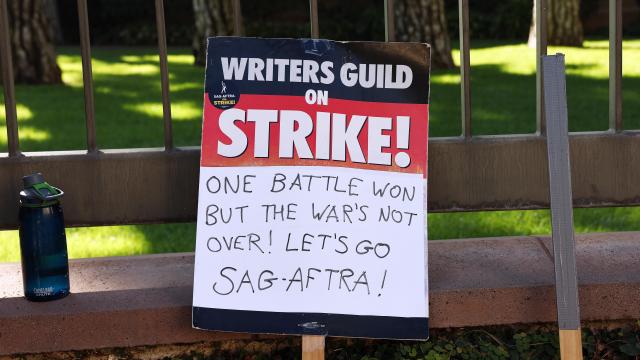After nearly 150 days on strike, the Writers Guild of America and the Association of Motion Picture and Television Producers have finally reached an agreement. The unit members celebrated across the country, and now the WGA has released a Memorandum of Agreement, as well as some additional documents to inform members what nearly five months of withheld work, union solidarity, and standing up for their value has won them. You can read the full Memorandum here.
First, artificial intelligence. It’s been speculated that this was a key point of control for the AMPTP, which might want to retain AI rights in order to replace writers. This MBA now prevents that, and enacts common-sense AI restrictions that put a lot of power in the hands of the writers on how they want to use AI or have AI used within their projects.
From the summary on the WGA site:
- AI can’t write or rewrite literary material, and AI-generated material will not be considered source material under the MBA, meaning that AI-generated material can’t be used to undermine a writer’s credit or separated rights.
- A writer can choose to use AI when performing writing services, if the company consents and provided that the writer follows applicable company policies, but the company can’t require the writer to use AI software (e.g., ChatGPT) when performing writing services.
- The Company must disclose to the writer if any materials given to the writer have been generated by AI or incorporate AI-generated material.
- The WGA reserves the right to assert that exploitation of writers’ material to train AI is prohibited by MBA or other law.
This last part, where the WGA reserves its right to assert that AI use in any case goes against the MBA or any laws, allows space for the WGA to force the AMPTP back into bargaining or into a courtroom in order to protect the writing of folks within the unit. All of these restrictions are reasonable, and make sure to keep the writers of the WGA the focus, dictating what the company can and can’t ask writers to do.
Second, a lot was made of writers’ rooms, and the new agreement not only guarantees writers’ rooms minimums, but also increases the minimum salary that writers can expect when retained by a show after pre-development, which is an incredible step forward and truly will support the future of writers in the industry. This was an extremely necessary part of the contract, as it helps develop writers and allows everyone to build up a sustainable career.
Additionally, as a way to build up the support within the industry for screenwriting as a career, pensions and health fund contributions were increased. Health care was also extended for the entire unit for the next month, as members lost out on minimum qualifying days due to the strike.
Before this contract writers would often be treated like gig workers: paid very little during pre-development, forced to “break” a season within a week or two, and then told to go off and write scripts on their own, essentially avoiding writers’ room fees and minimum agreements. There are a lot of first-person accounts from writers supporting this on X/Twitter whenever this subject came up.
While the guild was not able to get residuals for streaming, it did get the AMPTP to agree to “viewership-based streaming bonuses” based on streaming numbers during the first 90 days of release. With regards to data transparency, the summary states that the companies will be giving the WGA “the total number of hours streamed, both domestically and internationally, of self-produced high budget streaming programs (e.g., a Netflix original series).” The WGA will be allowed to share this data with the unit in an “aggregated form.”
The unit will now vote whether or not to ratify the new agreement. Overall, the deal the WGA secured appears to be a huge increase for the writers. The WGA’s initial demands would have cost the AMPTP $US488 million per year (money it absolutely has). The deal the AMPTP presented in May would have only cost it $US86 million per year. The current deal being presented to membership sits at a $US233 million. The WGA’s first deal was ambitious, yes, but it got so much of what they wanted that this is fully a success for the union, and will help secure the future of screenwriting and television writing for years.
SAG-AFTRA is still on the picket lines, and the WGA is committed to standing alongside the actors who supported WGA members during the duration of the strike.
Want more entertainment news? Check out when to expect the latest Marvel, Star Wars, and DC releases, what’s coming to cinemas in Australia this year, and everything streaming this month across all platforms. Check out our dedicated Entertainment tab for more.
